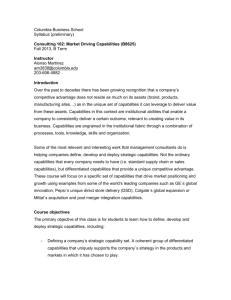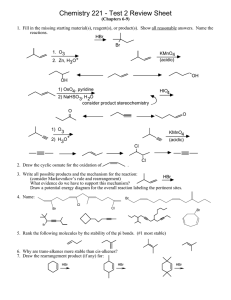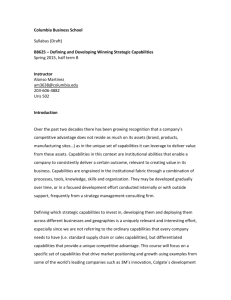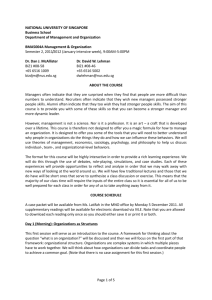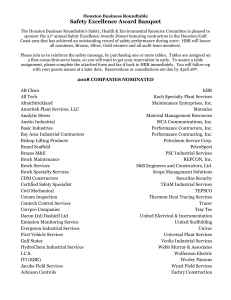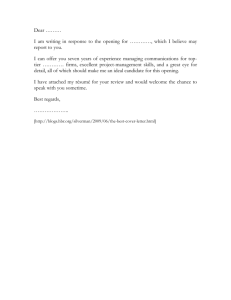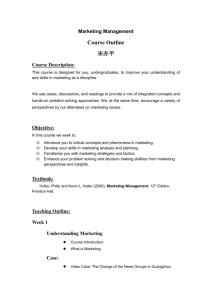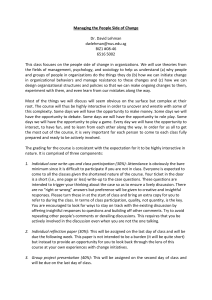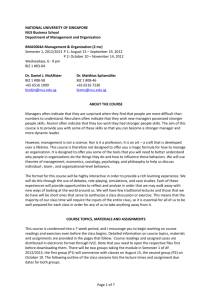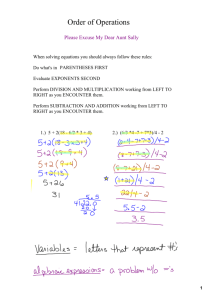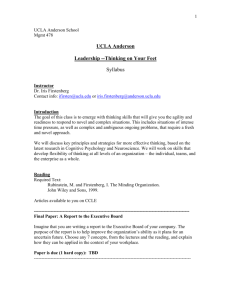OPIM311_WilliamChia
advertisement
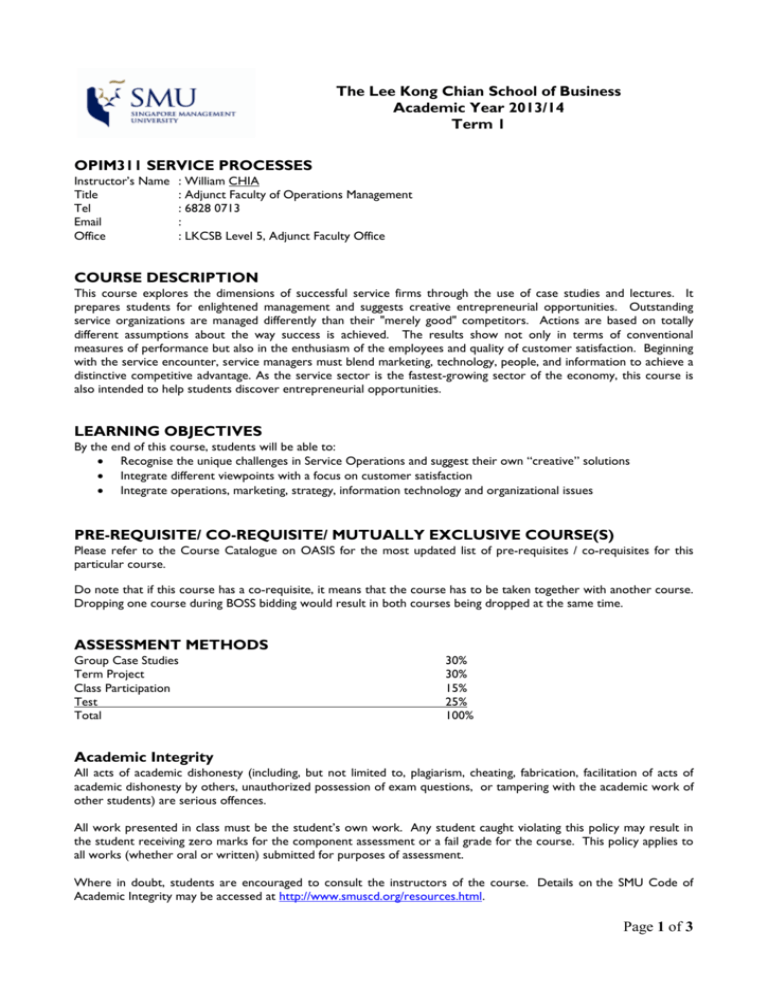
The Lee Kong Chian School of Business Academic Year 2013/14 Term 1 OPIM311 SERVICE PROCESSES Instructor’s Name Title Tel Email Office : William CHIA : Adjunct Faculty of Operations Management : 6828 0713 : : LKCSB Level 5, Adjunct Faculty Office COURSE DESCRIPTION This course explores the dimensions of successful service firms through the use of case studies and lectures. It prepares students for enlightened management and suggests creative entrepreneurial opportunities. Outstanding service organizations are managed differently than their "merely good" competitors. Actions are based on totally different assumptions about the way success is achieved. The results show not only in terms of conventional measures of performance but also in the enthusiasm of the employees and quality of customer satisfaction. Beginning with the service encounter, service managers must blend marketing, technology, people, and information to achieve a distinctive competitive advantage. As the service sector is the fastest-growing sector of the economy, this course is also intended to help students discover entrepreneurial opportunities. LEARNING OBJECTIVES By the end of this course, students will be able to: • Recognise the unique challenges in Service Operations and suggest their own “creative” solutions • Integrate different viewpoints with a focus on customer satisfaction • Integrate operations, marketing, strategy, information technology and organizational issues PRE-REQUISITE/ CO-REQUISITE/ MUTUALLY EXCLUSIVE COURSE(S) Please refer to the Course Catalogue on OASIS for the most updated list of pre-requisites / co-requisites for this particular course. Do note that if this course has a co-requisite, it means that the course has to be taken together with another course. Dropping one course during BOSS bidding would result in both courses being dropped at the same time. ASSESSMENT METHODS Group Case Studies Term Project Class Participation Test Total 30% 30% 15% 25% 100% Academic Integrity All acts of academic dishonesty (including, but not limited to, plagiarism, cheating, fabrication, facilitation of acts of academic dishonesty by others, unauthorized possession of exam questions, or tampering with the academic work of other students) are serious offences. All work presented in class must be the student’s own work. Any student caught violating this policy may result in the student receiving zero marks for the component assessment or a fail grade for the course. This policy applies to all works (whether oral or written) submitted for purposes of assessment. Where in doubt, students are encouraged to consult the instructors of the course. Details on the SMU Code of Academic Integrity may be accessed at http://www.smuscd.org/resources.html. Page 1 of 3 INSTRUCTIONAL METHODS AND EXPECTATIONS The course will be a combination of lectures and case discussions. Readings will be assigned for each class. Students are expected to come to class prepared. Class Participation Participation is a central part of the learning process for you and your classmates. When you contribute, you help others learn. Your participation mark reflects your contribution to your classmates’ learning. This includes attendance, full preparation prior to class including reading assigned materials and completion of mini-assignments, and active participation in class discussions and group activities. Groupings and group size Students will be divided into eight groups of between four and six. You are encouraged to find your own group members. Group Assignments Group assignments include a term project and case studies. Each Project team is to select and study one company within the nine industry sectors measured in the Customer Satisfaction Index of Singapore (CSISG 2011). Please note that the sub-sectors within the nine industry sectors can only be chosen once in each section. Course instructor will provide a project overview and the company selection criteria during week 1 lesson. Examinations There will be no final exam. An open-book test will be given in class in week 14. The test will be based on the topics discussed in class. CONSULTATIONS AND TEACHING ASSISTANTS For consultation, please email instructor or TA to make an appointment. RECOMMENDED TEXT AND READINGS Fitzsimmons, James A., and Mona J. Fitzsimmons, Service Management: Operations, Strategy, Information Technology, Seventh Ed., McGraw-Hill, 2011. (Required) Page 2 of 3 WEEKLY LESSON PLANS A tentative schedule is as follows (changes may be made according to the progress of the class). Week No. 1 2 Topics Readings i. Course overview F&F Ch. 1 - The Role of Services in an Economy ii. Introduction to SP F&F Ch. 2 - The Nature of Services Service Strategy F&F Ch. 3 - Service Strategy HBR “Lessons in the Service Sector” F&F Ch. 4 - New Service Development 3 Service Encounter F&F Ch. 5 - Technology in Services F&F Ch. 9 - The Service Encounter F&F Ch. 6 - Service Quality 4 5 6 Service Quality i. Case 1 - 3.1 ii. Case 2 - 3.2 i. Case 3 - 9.1 ii. Case 4 - 9.2 7 Service Performance Analysis: DEA 8 Recess Week (no class) 9 Managing Capacity & Demand 10 11 i. Case: Easy Profit ii. Service Facility Location i. Waiting Line Management ii. Simulation 12 Case: Manzana Insurance 13 Term project presentation 14 Study week 15 Open Book Test HBR “The Power of Unconditional Service Guarantees”. HBR “Putting the Service-Profit Chain to Work” HBR “Manage Your Human Sigma” F&F Ch. 8 Supplement F&F Ch. 11, 18 F&F Ch. 10 F&F Ch. 12, 16 and supplement Page 3 of 3
